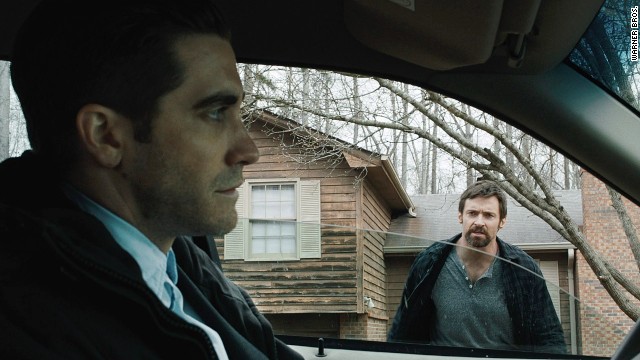
- "Prisoners" stars Hugh Jackman and Jake Gyllenhaal
- It's rooted in Hollywood revenge films but breaks new ground
- Thrilling and complex, the film earns an "A"
(EW.com) -- In movies like 1974's "Death Wish," where Charles Bronson played a walking statue of stoic wrath, vigilante justice is mean, nasty and also good, clean fun.
But then there's the kind of movie, like Sam Peckinpah's "Straw Dogs," that salutes lone-wolf vengeance while also making you feel the spiritual toll it takes — a breed of thriller that's exciting, cathartic and powerfully disturbing. "Prisoners" is that kind of movie. It's rooted in 40 years of Hollywood revenge films, yet it also breaks audacious new ground.
The film stars Hugh Jackman as Keller Dover, a brawny survivalist who is also a gentle-voiced suburban dad. On a rainy Thanksgiving afternoon, Keller brings his wife (Mario Bello) and kids over to the home of neighborhood friends (Terrence Howard and Viola Davis). The two families eat, drink and joke around, and nothing too remarkable happens — until everyone realizes that Keller's little daughter, Anna (Erin Gerasimovich), has left the house and disappeared, along with the other family's daughter, Joy (Kyla Drew Simmons).
EW: Fall movies we can't wait to see
A search turns up nothing, but later that night, the police find a pale, mostly mute young creep (Paul Dano) in smudged aviator frames and oily long hair hanging around in his skeevy RV camper — the same vehicle that the girls were trying to crawl up the ladder of that afternoon. The cops arrest this damaged-looking sad sack, interrogate him, and find no evidence. So they let him go. But Keller, after an encounter with the suspect outside the police station, is convinced that he's guilty. So he takes action. He kidnaps the creep, brings him to an abandoned apartment building, and beats him to a bloody pulp, over and over again. He threatens to kill the young man unless he confesses. But the suspect/victim says nothing.
If he is, in fact, innocent, then what Keller is doing is an unholy atrocity. But what if he's guilty? Are Keller's one-man torture-squad tactics justified then? And what if many people (along with the law) would declare that no, those tactics are still not justified? What should Keller do, given that every bone in his body is telling him that this is the only way he'll ever see his daughter again? What if every bone in his body is right?
"Prisoners," directed by Denis Villeneuve ("Incendies") from a script by Aaron Guzikowski, is no shallow payback thriller. It's a dazzingly potent, ambitious and complex movie, a film that forces you to ask questions that have no easy answers. What I've described is merely the film's first act. There are a great many twists and turns — both suspenseful and thematic — to come. Yet at the heart of "Prisoners" is something primitive and elemental and gripping, an obsession with torture, morality and the impotence of the justice system that speaks to our time as intensely (and maybe controversially) as the pitch-dark vigilante thrillers of the '70s once spoke to theirs.
EW's Jess Cagle talks porn sets with Hugh Jackman
Jackman, in a staggering performance that's unlike anything he has done before, acts with an unbridled rage, and he invests every snarl and rasp of that anger with meaning. Keller knows that in missing-child cases, each day the victim doesn't turn up radically increases the chances that she never will, and so his fury, even at its craziest, comes off as a desperate display of committed action.
Haunted by what might be happening to his daughter, he has — at least in his own mind — transcended the law, yet that leaves him with nothing to believe in but himself, and Jackman takes us on every step of that brave, terrible journey.
Each of the film's major performances is powerful. As the cop heading up the investigation, Jake Gyllenhaal has a moody danger that all but redefines him as an actor (for the first time, he doesn't seem like too nice a guy), and Melissa Leo, as the suspect's mother, unnerves you with the sinister banality of her homepsun Middle American quirkiness. She's the nightmare mom next door.
In its treatment of torture as a means to an end, "Prisoners" is very much a post-"Zero Dark Thirty" movie, even if the sin at its heart is child abduction rather than terrorism. Keller's remorseless treatment of his suspect echoes America's treatment of its captives at Abu Ghraib and other hidden locales after 9/11. Only this time it's personal: a desperate father out to save his daughter.
"Prisoners" takes the mythic simplicity of the vigilante film and adds arresting layers of ambiguity. Watching the movie, we behold Keller's actions and feel that they may be horribly unjustified — a daring place for a film to put its hero — and we also behold his actions and feel that they may be what true morality demands.
t's a sign of the film's power that either scenario could turn out to be true, and that each one is just as scary. Grade: A
See the original story at EW.com.
CLICK HERE to Try 2 RISK FREE issues of Entertainment Weekly
© 2011 Entertainment Weekly and Time Inc. All rights reserved.